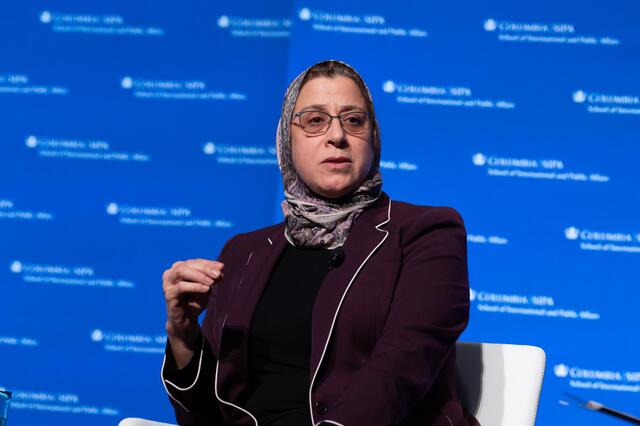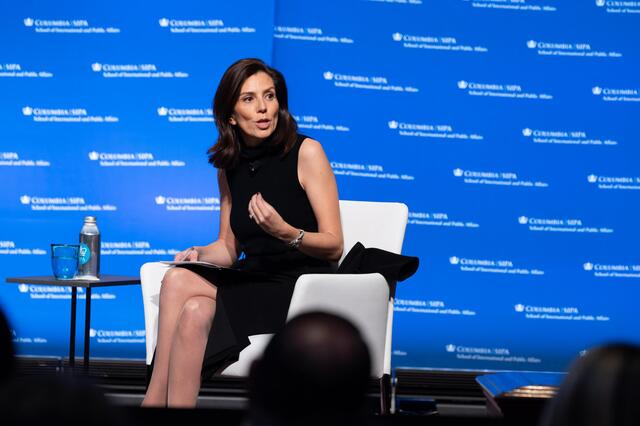In the wake of the October 7 terrorist attacks by Hamas and ongoing war in Gaza, many have expressed alarm about the rise of polarizing rhetoric on this issue – both on campus and off. Dean Keren Yarhi-Milo of SIPA and Dean Amaney Jamal of Princeton’s School of Public and International Affairs came together this week for two discussions on this subject — one at Princeton and one at Columbia — to discuss their scholarship on this conflict, reinforce the importance of fostering dialogue, and stress the role of universities in training students on how to have the nuanced, productive conversations required for policy solutions.
Jamal, a political scientist who has studied the drivers of political behavior in the Arab world, Muslim immigration to the United States and Europe, and related issues, observed that the intensity of feelings around the Israel-Palestinian issue often discourages faculty members from taking part in the conversation or teaching courses on the issue.
Image

“When there are efforts to censor what can and cannot be said, it's easier to leave that space void,” Jamal said. “And, unfortunately, what we're seeing today in many ways is part of a legacy that's been put in motion.”
Being able to speak openly and honestly is essential not only for civil discourse, said Jamal, but for effective teaching — ensuring what she called the “intellectual ‘oomph’” of the classroom.
Another part of that legacy, Yarhi-Milo said, is an "overly simplified” understanding of the conflict’s history that many students bring to the classroom. "We have to do better than those reductionist narratives,” she said. That’s one reason discourse is so essential, agreed Jamal.
The challenge is great. But the opportunity to lead by the opportunity to model is so much greater. And I try to focus on that.
— Dean Keren Yarhi-Milo
The two deans, who are Israeli and Palestinian, respectively, are friends and former faculty colleagues at Princeton.
At various times the conversation touched upon broader aspects of the Israeli-Hamas conflict, delving into the historical conditions, the role of the United States, and challenges in achieving a two-state solution. But it was most powerful when the two women spoke from the heart.
Image

Jamal talked about the experience of having been doxxed, highlighting the supportive responses from Jewish colleagues but also the profound anxiety and send of powerlessness that some of her Muslim students expressed.
Yarhi-Milo said it had also been “personally very difficult” for her to see the conflict and the responses on campus, but ultimately pointed to the value of the two women’s identities as leaders of different faiths and as educators.
“Because I'm Israeli, because Amaney is Palestinian, people look at us as two models of how this conversation could look like. How you could have friendships and disagreement and do this in a civil way,” Yarhi-Milo said. “So, it's challenging for sure — the challenge is great. But the opportunity to lead by the opportunity to model is so much greater. And I try to focus on that.”
The discussions at Princeton and Columbia come a month after Yarhi-Milo and Jamal published an opinion piece in the New York Times, “The Discourse Is Toxic, Universities Can Help,” in which the coauthors called on universities to do more to model civil discourse while also protecting students’ freedom of speech.
Watch the complete event:
"difficult" - Google News
December 02, 2023 at 04:13AM
https://ift.tt/5lIgbfd
Having Difficult Conversations on Campus | Columbia SIPA - Columbia SIPA
"difficult" - Google News
https://ift.tt/3QGUVg0
https://ift.tt/NTXw4VR
Bagikan Berita Ini














0 Response to "Having Difficult Conversations on Campus | Columbia SIPA - Columbia SIPA"
Post a Comment